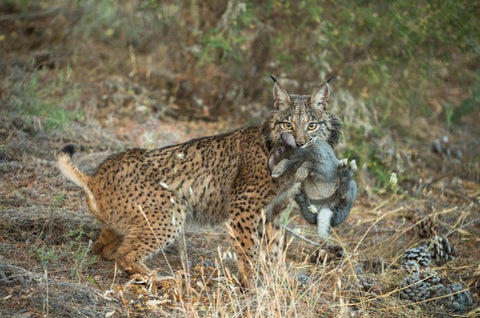Why is hunting necessary?

This is a big question that is often difficult to answer due to the enormous noise generated by certain animal rights groups, especially anonymous speakers who use social media to taint the truth about certain activities or sectors.
But reality is far from this perception: 87% of Spanish territory is currently designated for hunting. It is no coincidence that Spain's best-preserved national parks are managed by hunters. Nor is it a coincidence that the recovery of the Iberian lynx is especially fruitful on private hunting estates. Nor is it a coincidence that animal disease control is not viable without the support of hunters. Nor is it a coincidence that the best land management is one that is carried out in a coordinated manner across different uses, including agriculture, hunting, forestry, and tourism.
Let's go into more detail...why is hunting necessary?
1. Prevents crop damage and reduces accidents
According to the 4th Report on vehicle-animal collisions by the Ponle Freno Road Safety Study Center, traffic accidents caused by wild boars have increased by 47% in the last two years. This figure is a warning to all hunters, especially those who travel daily on roads with open access for these species. To reduce this figure, it is important to properly manage game populations. This will reduce traffic accidents, something that hunting contributes to society and that not everyone is aware of.

2. Disease control
Hunting is essential to ensure the presence of a balanced number of animals that is sustainable for the territory and ecosystem where they live.
An overpopulation of a species in a given area poses a threat to public health and safety, as well as to its natural environment and other wildlife. This often leads to food shortages, forcing some species to leave their habitat and move to inhabited areas in search of food. This also leads to the risk of contracting diseases that affect both domestic animals and humans.

3. Economic impact in rural areas
Hunting contributes €6.475 billion to GDP each year and helps support 186,758 jobs, the vast majority of which are in rural areas. It directly contributes €614 million to public funds through taxes and fees.
Hunting creates jobs. As established by applicable regulations, there are a number of activities, such as population management, deer stalking, driven hunts, and the execution of exceptional permits, in which the hiring of a game warden is mandatory. This creates a number of jobs that establish employment in rural areas.
We must not forget the jobs created in gun shops, service companies, veterinary clinics, tablet sales, etc.

4. Environmental conservation tool
The sector invests almost 300 million euros annually in the protection, conservation, and improvement of our ecosystems. As a sport, it is the third most practiced activity in Spain, behind only soccer and basketball. One in three Spanish game reserves actively participates in conservation programs for species such as the Iberian lynx, the brown bear, and the Spanish imperial eagle.
Just as rural areas with hunting reserves experience a significant economic boost, there is also a positive impact on the natural environment surrounding these villages. Hunting in hunting reserves helps clean up the forests and natural areas where it is practiced.

5. Management tool that avoids paying more taxes
Among the main results of the study conducted by the Artemisan Foundation on the Opinions and Attitudes of Spanish Society toward Hunting, it is noteworthy that more than 60% of Spaniards agree that they are not willing to pay more taxes for the Public Administration to take charge of wildlife population control. Furthermore, 71% of those surveyed are in favor of using hunting to carry out such control.

6. Recovery of protected species
Certain animals are currently in serious danger of extinction, such as the Iberian lynx, which is abundant in hunting reserves. You should know that hunting endangered animals is strictly prohibited by law, and anyone who does so can be fined or even imprisoned. These demarcated areas promote their development and growth, reducing the problem of their disappearance. Thus, the Iberian lynx survived because populations of wild rabbits and partridges were maintained in private reserves for their food.

And you, why do you hunt? SHARE IT!
Want to be featured on our Instagram and share your passion for hunting? Send us your video! (You can find examples of how to do it on our Instagram @ywhunters ).
👉🏽Vertical format
👉🏽Half-length or full-length
👉🏽30/40 seconds maximum
📤 Send to: Whatsapp +34 623288514 or email admin@youngwildhunters.com
We want to hear from you!
Author: María Balletbó
